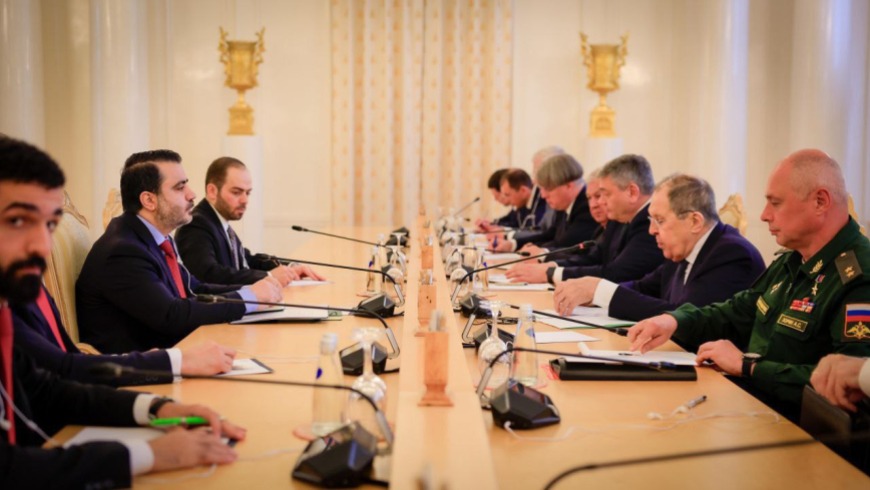In a landmark diplomatic overture, Syrian Foreign Minister Asaad al-Shibani led a high-level delegation to Moscow, marking the first official visit by Syria’s transitional government since the fall of Bashar al-Assad’s regime on 8 December 2024. Accompanied by Defence Minister Murhaf Abu Qasra and Intelligence Chief Hussein al-Salama, the delegation’s visit signals Damascus’s intent to recalibrate its relationship with Russia—once Assad’s staunchest ally—on the basis of sovereignty and mutual interest.
A Strategic Diplomatic Shift
Eight months after the end of Assad’s rule, Syria’s outreach to Moscow represents a pragmatic approach by the transitional government, led by Hayat Tahrir al-Sham (HTS), to engage with global powers. While Russia’s 2015 military intervention in Syria prolonged Assad’s regime—contributing to mass displacement and alleged war crimes—the new leadership in Damascus is seeking a more balanced relationship.
Foreign Minister Shibani underscored Syria’s commitment to partnerships grounded in “respect and mutual benefit”, aiming to dismantle the exploitative dynamics of the Assad era, when Moscow secured extensive military and economic concessions at Syria’s expense.
Historical Context: Russia’s Legacy in Syria
Under Assad, Syria became deeply enmeshed in Russian political, military, and economic interests. Notably, a 2019 deal granted Russia’s Stroytransgaz a 49-year lease on Tartous port, while a 2018 agreement awarded phosphate mining rights in Homs for 40 years. Russia also established a lasting military presence via the Hmeimim airbase in Latakia, with agreements signed in 2015 and 2017 allowing continued occupation of military sites until 2066, with automatic 25-year renewals.
As Assad’s regime faltered in late 2024, Russia’s strategy appeared to shift. Though airstrikes persisted until 7 December, they largely avoided opposition strongholds. Turkish Foreign Minister Hakan Fidan later claimed that Russia could have prevented Assad’s fall but chose not to, hinting at a strategic decision to preserve influence post-Assad. Iran, by contrast, reportedly viewed Russia’s passivity during Operation Deterrence of Aggression as a betrayal, particularly after Moscow granted Assad asylum and retained significant assets.
Objectives of the Syrian Delegation
The Syrian delegation, which included Maher al-Shar—a Russian-speaking physician with prior coordination experience—focused on several core issues:
- Reevaluating Legacy Agreements: Shibani announced the formation of a joint ministerial committee to reassess deals made under Assad, especially those impacting Syria’s reconstruction.
- Condemning Israeli Attacks: The minister denounced Israel’s ongoing airstrikes, including a recent hit on the Ministry of Defence, accusing Tel Aviv of exacerbating instability, particularly in Suweida, where Druze separatism is rising.
- Transitional Justice and Accountability: Damascus appealed for Russian support in its transitional justice efforts, including the extradition of Assad and other former officials implicated in abuses.
- Military and Security Coordination: Discussions included rearming the Syrian military—long reliant on Russian arms—and coordinating counterterrorism strategies, particularly around Qamishli airport, where Russian military police are stationed.
- Kurdish Reconciliation: The delegation addressed the stalled March agreement with the Syrian Democratic Forces (SDF), requesting Russian mediation to advance negotiations.
- Sanctions Relief and Reconstruction: Russian Foreign Minister Sergey Lavrov reiterated calls to lift Western sanctions on Syria, pledging Moscow’s backing for stability and the upcoming September 2025 parliamentary elections.
Toward a New Bilateral Framework
Lavrov affirmed Russia’s support for Syria’s sovereignty and stability, denouncing external efforts to destabilise the country. He commended Damascus’s protection of Russian diplomatic staff and extended an invitation to President Ahmad al-Sharaa for the inaugural Russian-Arab Summit in October 2025.
Describing the talks as a “turning point”, Shibani expressed hope for a “distinguished strategic partnership” supporting Syria’s reconstruction and justice objectives.
Navigating Regional and Global Alignments
The visit reflects Syria’s nuanced approach to international diplomacy. Following a high-profile meeting with US President Donald Trump in Riyadh, Damascus is now working to balance Western engagement with regional partnerships. Russia, weakened by its military focus on Ukraine and broader Western tensions, still sees value in retaining influence in Syria through engagement with the new leadership.
Analysts view Damascus’s outreach as both pragmatic and strategic. By fostering dialogue with both Washington and Moscow, the transitional government hopes to garner support for rebuilding efforts and enhance its international legitimacy—without reverting to the dependency that characterised Assad-era foreign relations.
Foreign Minister Shibani’s Moscow visit marks a pivotal moment in Syria’s post-Assad foreign policy, representing a bid to forge equitable relations with a powerful former patron. With the formation of a bilateral committee to review past agreements, Damascus appears determined to reclaim its sovereignty while maintaining diplomatic leverage. Yet, the road to a rebalanced partnership remains fraught with legacy contracts, unresolved conflicts, and complex geopolitical dynamics. As Syria’s transitional government confronts pressing domestic and international challenges, its success will hinge on securing meaningful commitments that serve its national interests—without repeating the patterns of the past.


